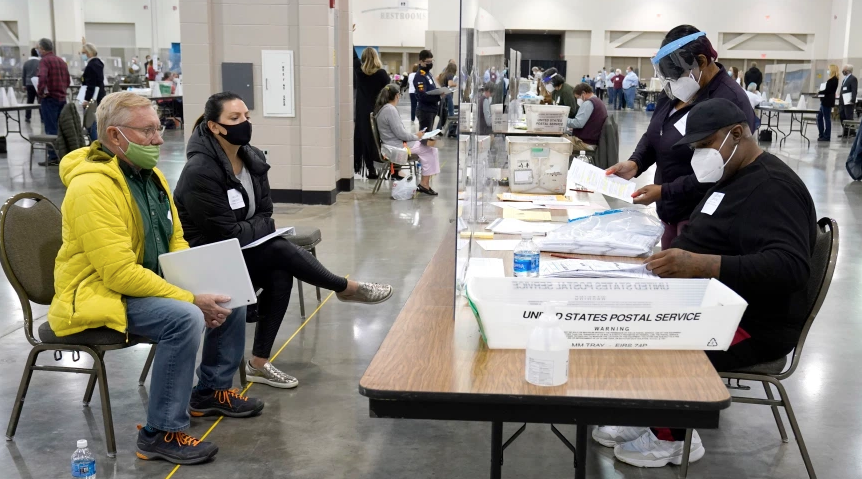President Trump's campaign filed a lawsuit challenging the targeted recount in Wisconsin's state originally requested by the campaign in mid-November. The campaign alleges that there were approximately 221,000 invalid and/or illegal absentee ballots. The lawsuit asks the court to nullify Governor Evers' certification of the presidential election results due to large numbers of allegedly tainted ballots found in Milwaukee and Dane counties. The race was close with a margin of only 20,427 votes or 0.620 percent between candidates Joe Biden and President Trump.
Filed on Nov. 18 by the Trump campaign, the Recount Petition alleges "mistakes, irregularities and illegal behavior affecting more than enough votes to alter the election outcome." The recount began on Friday, Nov. 20, and was completed on Sunday, Nov. 29, 2020. The complaint says that absentee balloting is a privilege and, therefore, strict regulations must be followed. The campaign requested the recount because the safeguards and regulations put in place to "prevent potential fraud and abuse" were not followed in the 2020 election.
A May 2019 article from Wisconsin Election Integrity explains what can happen in recounts, especially when there are large numbers of mailed in, early, and absentee ballots as there were in 2020. Wisconsin recount legislation lays out more rigorous standards and procedures than many other states. It is not unusual to find irregularities and errors in the recount process, especially with absentee ballots. In Wisconsin, for example, the 2016 recount found widespread errors with absentee ballots.
More than double the number of absentee ballots were cast this year compared to 2016. This year, the Wisconsin Elections Commission estimated that about 1.9 million people in Wisconsin returned an absentee ballot as of Nov. 2.
Indeed, a number of irregularities were found in the absentee ballots during the recount. A total of 170,140 absentee ballots were issued and cast in Milwaukee (108,947) and Dane (61,193) Counties during the 14-day period in which in-person absentee balloting was allowed. The ballots during that period were issued without "having first received written application."
A total of 5,517 ballots were cast in Milwaukee (2,215) and Dane (3,302) counties with incomplete or incorrect ballot envelopes. In fact, Clerks "changed the ballot envelopes after they had been submitted by supplying missing witness address information or ballot envelopes were left incomplete but [improperly] counted." A state law passed in 2015 requires the exclusion of such ballots.
28,395 indefinitely confined absentee ballots issued to those claiming that status after March 25, 2020, were cast in violation of the law without the required photo identification. Municipal clerks should have reviewed and expunged those voters from the rolls prior to the election.
17,271 absentee ballots were completed and/or delivered to employees of the city of Madison on Sept. 26 and Oct. 3 at 206 separate locations in an event dubbed "Democracy in the Park." The lawsuit alleges that such coordinated activity is illegal, in part, because it was advertised widely by the Biden campaign but, more importantly, because it employed city employees to register, instruct in the process of absentee ballots, help complete them and serve as witnesses. Alternatively, if the helpers were not city employees, those ballots should have been returned by mail or delivered in person by the voter to the municipal clerk.
The campaign sought relief from the court in the following areas:
- Withdrawal of certification by the Governor of the election and electors.
- Exclusion of any absentee ballots as "defective from the Recount totals and any certified Election results, or results used to issue a Certificate of Election, In-Person Absentee Ballots without an associated written application, Incomplete and Altered-Certification Absentee Ballots, Indefinitely Confined Absentee Ballots, as defined earlier, and "Democracy in the Park" Absentee Ballots."
- Prohibition of the Wisconsin Election Board from preparing, and Gov. Evers from signing, a certificate of election without the exclusion of the aforementioned absentee ballots.
The purpose of the requests was to ensure that, "when the Court determines the outcome in this matter, the appropriate set of electors will be duly qualified to cast Wisconsin's electoral votes."
The Wisconsin Supreme Court gave Gov. Evers until 8:30 p.m. on Tuesday to respond. Evers' team delivered a 65-page response. He said that the Trump campaign lawsuit seeks to disenfranchise voters and should have been filed in the circuit court first. Evers' filing says that by "focusing on alleged technical violations in only two counties, he has made plain that his intent is not to fairly determine who Wisconsinites voted for to lead our country. He is simply trying to seize Wisconsin’s electoral votes, even though he lost the statewide election." The Court has not yet said whether it will hear the case.


